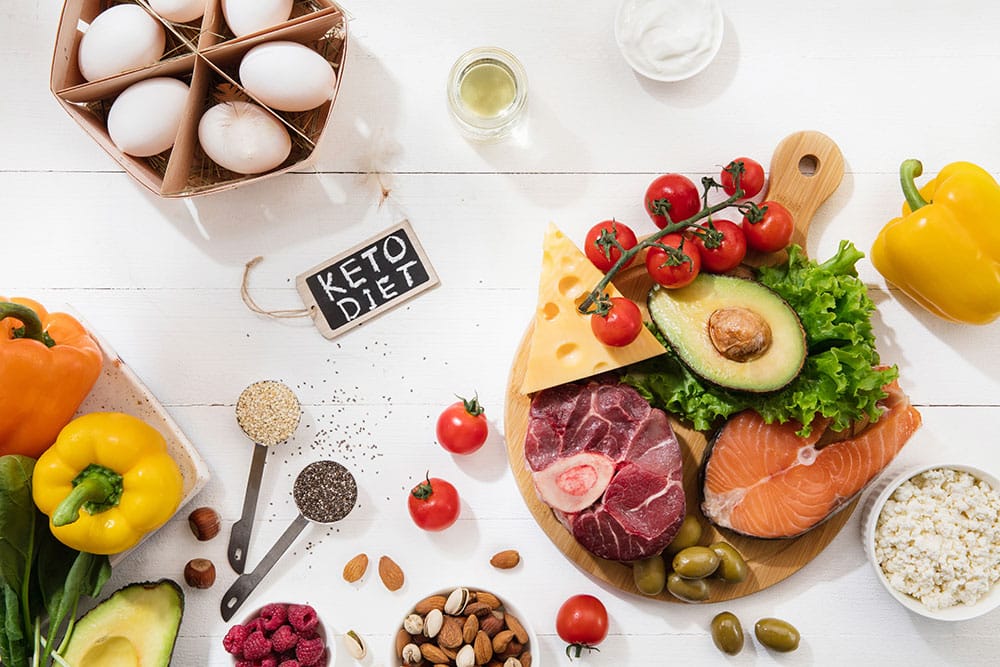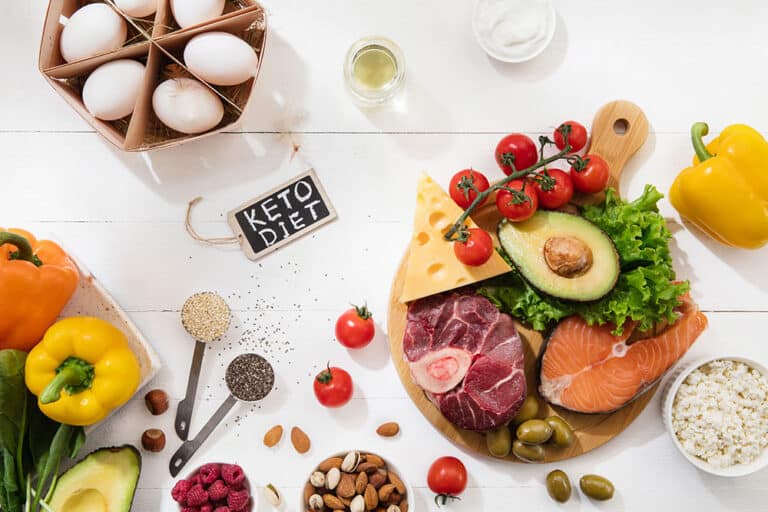Understanding the Ketogenic Diet
Principles of the Keto Diet
The ketogenic diet focuses on consuming a very low amount of carbohydrates and replacing them with fats. This shift puts the body into a metabolic state called ketosis, where fat becomes the primary source of energy. By minimizing carb intake to as little as 5-10% of daily calories, the body begins to burn fat for fuel, which aids in weight loss and energy management (Healthline).
Macronutrient Breakdown:
- Carbohydrates: ~5-10% of daily intake
- Protein: ~15-20% of daily intake
- Fat: ~70-80% of daily intake
In a typical 2,000-calorie keto diet, this translates to:
| Macronutrient | Grams per Day |
|---|---|
| Fat | 165g |
| Carbohydrates | 40g |
| Protein | 75g |
The diet prioritizes high-quality, nutrient-dense foods. Individuals are encouraged to consume free-range, pasture-raised eggs and poultry, grass-fed beef, crate-free pork, sustainable and wild-caught fish, and organic products whenever possible (Ketologic).
For a detailed plan, refer to our ketogenic diet meal plan.
Health Benefits of a Keto Lifestyle
The ketogenic diet offers a spectrum of health benefits, particularly for those seeking weight loss and improved metabolic health. By drastically reducing carb intake and increasing fat consumption, the body not only burns fat more efficiently but also enjoys several other health improvements.
Key Benefits:
- Weight Loss: Users often experience significant weight loss, as ketosis accelerates fat burning. Participants in studies have reported losing an average of 26.2 pounds (11.9 kg) over a 2-year period.
- Improved Blood Sugar Management: The diet can boost insulin sensitivity and is particularly beneficial for people with type 2 diabetes or prediabetes.
- Reduced Risk of Diseases: Evidence suggests potential benefits against diabetes, cancer, epilepsy, and Alzheimer’s disease.
Health Statistics:
- Average Weight Loss: 26.2 pounds (11.9 kg) over 2 years
- Improved Blood Markers: Significant reduction in the usage of certain blood sugar medications
By following a ketogenic lifestyle, individuals may not only lose weight but also improve their overall health markers. Always consider consulting a healthcare provider before starting any new diet, especially one as restrictive as keto.
For more information on how the ketogenic diet can aid in weight loss, visit our dedicated page on ketogenic diet for weight loss.
Navigating Keto Diet Risks
While the ketogenic diet offers potential benefits like weight loss and improved blood sugar levels, it’s important for individuals to be aware of the risks associated with adopting this high-fat, low-carb lifestyle.
Potential Health Risks
Engaging in the ketogenic diet comes with several potential health risks that should be considered. A comprehensive meta-analysis published in July 2021 revealed several serious health concerns for those who follow ketogenic diets:
- Increased risk of heart disease
- LDL cholesterol buildup
- Kidney failure
- Alzheimer’s disease
- Diabetes
- Cancer
Furthermore, pregnant individuals or those planning to become pregnant face elevated risks such as birth defects, neural tube defects, and gestational diabetes when following a low-carbohydrate ketogenic diet. Individuals with chronic kidney disease may encounter worsened kidney damage due to high protein consumption (Forks Over Knives).
| Health Risk | Description |
|---|---|
| Heart Disease | Increased LDL cholesterol levels leading to heart complications |
| Kidney Failure | High protein intake exacerbating kidney damage |
| Alzheimer’s Disease | Potential cognitive decline due to dietary restrictions |
| Diabetes | Increased risk despite initial improvements in blood sugar levels |
| Cancer | Higher likelihood due to dietary emphasis on red and processed meats |
Concerns and Limitations
In addition to specific health risks, there are various broader concerns and limitations associated with the ketogenic diet. Some of the primary concerns include:
- Nutrient Deficiencies: The restriction of carbohydrate-rich foods like vegetables, fruits, legumes, and whole grains can lead to nutrient deficiencies. Essential vitamins and minerals might be lacking, potentially resulting in health problems over time (UChicago Medicine).
- Kidney Stones and Constipation: The diet’s high-fat, low-fiber content can increase the risk of developing kidney stones and experiencing constipation.
- Social Isolation and Disordered Eating: Maintaining the strict dietary guidelines of keto can lead to social isolation and disordered eating patterns. The diet’s restrictive nature can make social activities involving food challenging and may contribute to an unhealthy relationship with food.
- Sustainability Issues: While the keto diet may initially result in weight loss, it is often not sustainable for the long term, leading to potential weight regain and more than the initial loss.
Individuals considering the ketogenic diet should be aware that it may not be appropriate for those with conditions involving the pancreas, liver, thyroid, or gallbladder. It is essential to consult with a healthcare professional before starting the diet.
The ketogenic diet was originally developed in the 1920s for patients with severe drug-resistant epilepsy, demonstrating efficacy in reducing seizures by limiting glucose availability to neurons. While beneficial in these extreme cases, the risks associated with the diet may outweigh the rewards for most people.
For those interested in exploring keto-friendly meals while mitigating potential risks, it’s crucial to balance the diet with nutritional considerations. Visit our article on creating a balanced ketogenic diet meal plan and check out practical tips on maintaining the right keto ratio.
Meal Inspiration on Keto
For those following the ketogenic diet, finding delicious and nutritious meal options can make all the difference. Below are some mouthwatering ideas for breakfast, lunch, and dinner that will keep you on track with your ketogenic diet meal plan.
Keto Breakfast Ideas
A good breakfast is key to starting your day on the right foot. Here are some enticing keto-friendly breakfast options:
- Keto Yogurt Berry Bowl – Made with full-fat Greek yogurt, mixed berries, and a sprinkle of chia seeds.
- Keto Chocolate Chip Muffins – Almond flour-based muffins that are low in carbs but high in flavor.
- Air Fryer Spinach Egg Cups – Whisked eggs mixed with spinach, bacon bits, and cheese, cooked to perfection in an air fryer.
- Keto Protein Yogurt Seed Bowl – Greek yogurt, topped with a mix of hemp seeds, pumpkin seeds, and sunflower seeds, providing a protein-packed start to the day.
| Recipe | Net Carbs (g) | Protein (g) | Fat (g) |
|---|---|---|---|
| Yogurt Berry Bowl | 7 | 10 | 12 |
| Choc Chip Muffins | 4 | 5 | 10 |
| Spinach Egg Cups | 3 | 10 | 15 |
| Protein Seed Bowl | 6 | 12 | 16 |
Information courtesy of Ruled.me.
Lunch Options on a Keto Diet
Midday meals should be vibrant, nutritious, and satisfying to keep up your energy levels. Consider these options:
- Avocado Cobb Salad Stuffed Peppers – Fresh bell peppers stuffed with avocado, bacon, hard-boiled eggs, and cheese.
- Keto Smoked Salmon Summer Salad – A mix of smoked salmon, mixed greens, avocado, and a light olive oil dressing.
- Keto Sushi Rolls – No rice needed! Made with seaweed sheets, avocado, cucumber, and canned tuna or salmon.
- Sardine Mixed with Creamy Dressing – Sardines tossed in a blend of mayonnaise, mustard, and spices, served on a bed of lettuce.
| Recipe | Net Carbs (g) | Protein (g) | Fat (g) |
|---|---|---|---|
| Stuffed Peppers | 5 | 10 | 18 |
| Smoked Salmon Salad | 6 | 15 | 20 |
| Keto Sushi Rolls | 4 | 14 | 8 |
| Sardine Creamy Dressing | 2 | 12 | 22 |
Recipes from Ruled.me.
Satisfying Dinner Recipes
Dinner should be a savory and satisfying way to cap off your day. Here are some delectable dinner ideas:
- Keto Buffalo Chicken & Cauliflower Casserole – Spicy buffalo chicken mixed with cauliflower and cheese, baked until golden.
- One-Pan Chicken & Asparagus with Garlic Sauce – Juicy chicken breast seared with asparagus and covered in a garlic-infused sauce.
- Easy Mediterranean Cod and Asparagus – Baked cod with a medley of Mediterranean spices, served with roasted asparagus.
- Savory Ground Lamb with Vegetables – Ground lamb sautéed with mixed vegetables, seasoned with herbs.
- Ground Turkey with Green Beans in Asian-Inspired Sauce – Sautéed ground turkey, green beans, and Asian-style spices.
| Recipe | Net Carbs (g) | Protein (g) | Fat (g) |
|---|---|---|---|
| Buffalo Chicken Casserole | 7 | 20 | 25 |
| Chicken & Asparagus | 5 | 25 | 12 |
| Mediterranean Cod | 6 | 24 | 14 |
| Ground Lamb & Veggies | 8 | 22 | 22 |
| Turkey & Green Beans | 6 | 23 | 10 |
Recipes inspired by Ruled.me.
These meal options are not only satisfying but also align perfectly with the principles of the keto diet and its health benefits. Happy cooking!
Practical Keto Diet Tips
Maintaining the Keto Ratio
Adhering to the correct macronutrient ratio is critical in maintaining ketosis, the metabolic state at the heart of the ketogenic diet. The keto diet requires 75 percent of calories to come from fat, 5 percent from carbohydrates (approximately 20-50 grams per day), and 15 percent from protein. It takes roughly 72 hours for the body to enter ketosis on this plan.
| Macronutrient | Percentage of Daily Calories | Grams Per Day (approx.) |
|---|---|---|
| Fat | 75% | 165 |
| Carbohydrates | 5% | 20-50 |
| Protein | 15% | 75 |
Unlike other low-carb diets that focus heavily on protein, the keto diet emphasizes fat. Up to 90% of daily calories may come from fat, relying on ketone bodies produced from stored fat for energy (Harvard Health Publishing). The typical keto plan limits carbs to 20–50 grams per day, allowing for a variety of protein sources, dairy, low-carb vegetables, and healthy fats.
Essential Food Choices
The ketogenic diet has specific dietary recommendations to maintain ketosis effectively. Here are some essential food choices:
-
Animal Proteins: Foods like seafood, meat, and poultry are staples. These proteins are carb-free, rich in B vitamins and minerals, and provide high-quality protein. Fish such as salmon are especially beneficial due to their omega-3 fatty acids, which are linked to lower insulin levels and improved insulin sensitivity (Healthline).
-
Cheese: Most cheeses are low in carbs and high in fat. An example would be cheddar cheese, which contains 1 gram of carbs, 6 grams of protein, and is a good source of calcium per ounce. Cheese also contains CLA, a compound associated with fat loss and better body composition.
-
Dairy Options: Plain Greek yogurt, cottage cheese, cream, and half-and-half are excellent for the keto diet. These high-protein dairy products help decrease appetite and promote satiety when consumed in moderation (Healthline).
Snacking Smart on Keto
Snacking is an integral part of sustaining energy and nutrition throughout the day. Here are some tips for snacking smart on keto:
-
Keto-friendly Snacks: Choose snacks that are rich in fats, proteins, or both, and include a side of vegetables for added micronutrients and fiber. Examples include avocado slices, cheese sticks, nuts, and boiled eggs.
-
Cooking Oils: Utilize heart-healthy oils such as olive oil, avocado oil, MCT oil, and coconut oil. These oils are not only keto-friendly but also assist in maintaining ketosis and increasing satiety.
For a deeper dive into creating a balanced keto meal plan, check out these resources on ketogenic diet meal plan and what is the ketogenic diet. Properly balancing your diet and making smart food choices can help you achieve and maintain your ketogenic diet for weight loss goals efficiently.
- About the Author
- Latest Posts
Johnnie D. Jackow Sr., the founder and CEO of Total Body Fitness, Worldwide, has a long-standing career in the fitness industry. He began as a certified personal trainer in the mid-90s and soon after authored his first weight loss book in 1998. This led to the launch of Total Body Fitness, Nationwide in the USA at the same time. Johnnie gained recognition as the fitness guru of his time, running infomercials on local TV late at night in Houston, Texas. Over the years, he has helped more than 40,000 individuals from all over the world achieve their health and fitness goals. With over 60,000 hours of documented training in integrative functional medicine, he completed his PhD in human physiology in 2010. His primary objective is to assist people in reaching their health and fitness goals through alternative approaches rather than relying solely on conventional medicine and pharmaceutical drugs. Today, with almost three decades of experience under his belt, Johnnie continues to be a leader in health and fitness.






